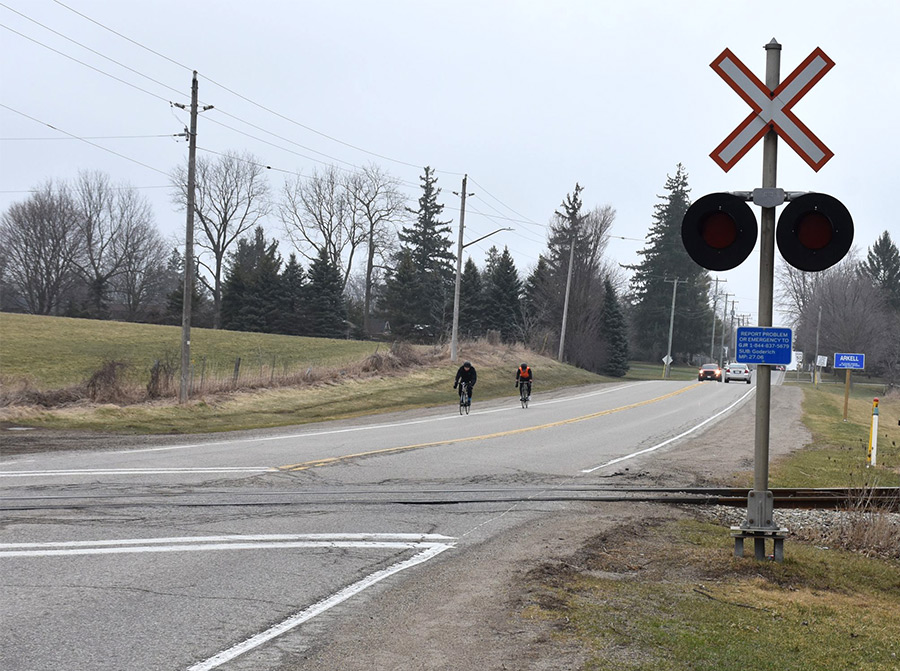PUSLINCH – There’s good and bad news for Arkell residents frustrated with how the Guelph Junction Railway (GJR) has been operating in their community.
A whistle cessation agreement that local families have been calling for is unlikely to happen after Pusliunch council directed CAO Glenn Schwendinger on June 16 to abandon the agreement with GJR, citing safety and liability issues for the township.
However, according to Mayor James Seeley, GJR has agreed to reduce its hours of operation and is taking steps to mitigate noise issues.
Residents who live near the railway crossings – including Carter, Arkell, Watson, Hume and Malty roads and Wellington Road 34 – have joined together to form the Train Committee of Concerned Citizens of Puslinch.
Recently the group, which consists of over 35 families, has focused on concerns over the GJR’s use of its loud horn at railway crossings, the train’s Arkell siding loading noise, and its hours of operation. The train has frequently passed through the township well after midnight, residents say.
At its June 16 meeting, council received for information a letter from Bruce Taylor, who has spoken on behalf of the train committee as talks between the township, GJR, and City of Guelph have unfolded in recent months.
Taylor and the train committee have been calling on the township to enter into a whistle cessation agreement with the GJR, similar to an agreement that Guelph has with the railway. They say a whistle cessation agreement would be safer for members of the community, and less disruptive.
The trains slow down at train crossings to a much slower speed while in Guelph, allowing them to use the quieter engine bell. Without a similar agreement in Puslinch, the trains still use their horn and don’t slow down nearly as much as they do while passing through Guelph.
All members of council agreed the township should not pursue a whistle cessation agreement, due to concerns over safety and liability. This will allow the township to focus on the other core issues – the train’s hours of operations and unloading noise.
“I’ve heard from several (members) of the agricultural community who have let me know just how important that whistle is for their safety, crossing the railway either at private crossings on their own properties, or at the road where sightlines aren’t great,” said councillor Matthew Bulmer.
“That whistle is the difference between life and death, no matter how slow the train is going. I wouldn’t be interested in pursuing any whistle cessation agreements with the City of Guelph or the train.”
Councillor Jessica Goyda was also not in favour of pursuing a whistle cessation agreement, pointing to first-hand experiences where she had close calls with the train.
“When I was crossing that railroad, I was missed by a fraction of a second, and the only reason I stopped was because I heard that whistle,” said Goyda.
She noted it has been implied there’s a double standard surrounding the train’s use of its whistle at crossings, with Puslinch residents being held to a different standard as those in Guelph.
“I am struggling with that, because I don’t think we’re really comparing apples to apples,” she said.
“We’re talking about an urban community and a rural community.”
Goyda added with many young children and teenagers living near the railway, not having the whistle blow is a danger to the community.
“I don’t think the train should be going through at all in the middle of the night, but when the train does go through, I think it needs to blow its whistle,” she said.
Goyda said the main concerns right now are the train’s hours of operation and unloading noise.
She said the township will be able to pursue these issues more effectively if time isn’t consumed by pursuing a whistle cessation agreement.
Councillor John Sepulis initially was hesitant to give up on pursuing a whistle cessation agreement this early in the process.
“I think it behooves us to at least go through the steps to find out what the costs and liabilities are,” he said.
Schwendinger said the township could be held liable if an accident were to occur after a whistle cessation bylaw is enacted, noting this has happened in other municipalities in the past.
Sepulis then agreed with other councillors, saying, “I really don’t want us to be liable for any accidents.”
Mayor James Seeley also was not in favour of a whistle cessation agreement.
“Most, if not all, of our crossings have significant sightline concerns, elevation concerns, and farmer concerns,” said Seeley.
“These are not things that I want to put on the residential taxpayer as a liability.”
The mayor added, “I’m confident in our CAO in his negotiations with GJR to maybe come up with some better hours of operation and to continue working towards some mitigation of noise from the unloading.”
The good news for the train committee, he explained, is that progress has been made regarding the GJR’s hours of operation and unloading noise.
Schwendinger said he has already received feedback from the GJR with regards to a number of the concerns that were passed along.
“They are progressing on a number of fronts, and from what I’m understanding, some of the impacts have been reduced,” he said.
“Not to the complete extent everyone is asking for at this point, but there has been some progress.”
Schwendinger said the GJR has reduced its hours of operation, so they do not operate as late at night.
He added they are also looking at technical adjustments to new unloading equipment.




